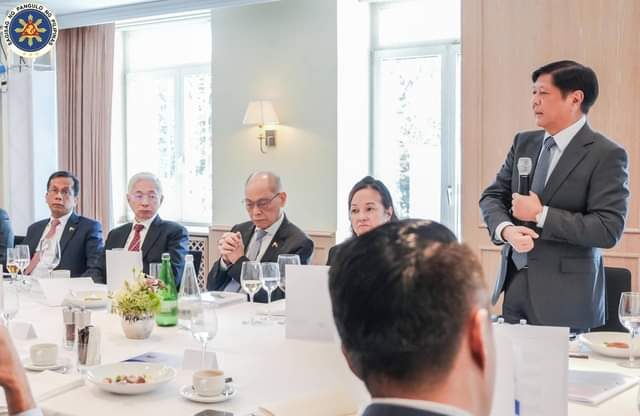SUMMARY
This is AI generated summarization, which may have errors. For context, always refer to the full article.

MANILA, Philippines – Even as the Philippines and China seek a “golden age” in their relationship, Philippine President Ferdinand Marcos Jr said tensions in the South China Sea occupy his mind during most of the day.
“Keeps you up at night, keeps you up in the day, keeps you up most of the time. It’s something… It’s very dynamic. It’s constantly in flux. So you have to pay attention to it and to make sure that you are at least aware of the present situation so that you’re able to respond properly,” said Marcos on Wednesday, January 18, in a long conversation with World Economic Forum (WEF) President Børge Brende in Davos.
Brende asked the Philippine President if the situation in the contested South China Sea – a vast waterway which Beijing claims the near entirety as its own – keeps him up at night.
“We have no conflicting claims with China. What we have is China making claims on our territory and that is our — that is how we approach the problem that we find,” Marcos told Brende.
The Philippine President also thumbed down the idea of resorting to our armed forces in the context of the conflict.
“There is no point in the Philippines building up its armory. First, we are not in an economic situation that we are able to build up to the levels that the Americans had, to the levels that the Chinese have and more importantly perhaps is our abiding belief that the solutions are not going to be military,” he said.
“And if they are going to be military, then they are not solutions because this will — it will end badly if it goes that way. It will end badly for everyone involved. And even those who are not involved,” he added.
Manila and Beijing have had a nebulous relationship dating back to the ’70s when diplomatic ties were established during the presidency of dictator Ferdinand E. Marcos, the father and namesake of the incumbent president.
In recent decades, these ties have gone through dramatic swings.
Manila drew close to Beijing in the decade of former president Gloria Macapagal-Arroyo’s administration through controversial deals. The relationship was strained during the term of the late president Benigno Aquino III, whose administration took China to the international court over a maritime dispute in the South China Sea.
Former president Rodrigo Duterte made a loud and big fuss over the country’s supposed pivot to China, although most of the pledges to the Philippines remained unkept promises until the end of his term in 2022.
Marcos has adopted a “friend to all, enemy to none” foreign policy. And when it comes to the Philippine exclusive economic zone in the South China Sea, Marcos says there is no conflict.
In 2016 though, the Philippines won its arbitration case against China in the South China Sea dispute as decided by the Permanent Court of Arbitration (PCA) in The Hague, Netherlands.
Marcos made a state visit to Beijing, his first outside of Southeast Asia, in early January 2023. In his bilateral meeting with Chinese President Xi Jinping, Marcos brought up the South China Sea while emphasizing that territorial disputes do not make the “totality” of Manila and Beijing’s ties.
“I would not be doing my job if I did not bring up these issues with President Xi when I had the opportunity,” he said.
Several countries, including those in Southeast Asia, have conflicting claims with China in parts of the expansive waterway. The Philippines calls the portion under its exclusive economic zone the West Philippine Sea, even as China continues to establish control over those same parts.
The Association of Southeast Asian Nations (ASEAN) and China have agreed on creating a Code of Conduct in the South China Sea but 10 years on, talks have failed to go beyond the agreement that a code should be in place.
China is among the Philippines’ largest trading partners. – Rappler.com
Add a comment
How does this make you feel?






There are no comments yet. Add your comment to start the conversation.